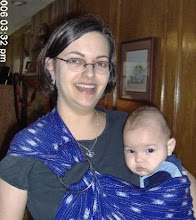Here's what's going on - at least, what's been in the news lately. Not a comprehensive list, but hopefully I'll get these updates out more often.
Alabama - SB240 and HB 314 establish a State Board of Midwifery. Link: Bill would allow home childbirth, a healthy option.
Idaho - HB 488 would provide for voluntary licensure for CPMs. Link: Idaho midwives want licensing option, ability to offer meds.
Maryland - HB 1407 would end the requirement that nurse-midwives practicing in Maryland have a written agreement with a doctor. Get the info from VBACFacts.com.
Missouri - Home birth supporters return with new midwifery measure:
Last year, lawmakers unwittingly approved a lay midwifery law after [Senator John] Loudon inserted an obscure medical term into a broader health insurance bill during the legislative session's frantic final days. The measure was signed by Gov. Matt Blunt but has since been overturned by a Cole County judge. An appeal to the state Supreme Court is pending.
Senate President Pro Tem Michael Gibbons responded to Loudon's tactics by removing him as chairman of the Small Business, Insurance and Industrial Relations Committee. He earned the job back by promising to push a bill repealing the law allowing those with private "tocological certification" to offer pregnancy-related care.
Tocology is a synonym for obstetrics, coming from the Greek root word of childbirth.
On Wednesday, the Senate Pension, Veterans' Affairs and General Laws Committee considered two Loudon bills - one to repeal the midwifery law, and the other to create a state licensing board to monitor midwives - but took no action.
New Hampshire - The NH legislature has passed a bill, SB131, which requires insurance companies to cover midwife-attended home births in that state:
The bill builds on New Hampshire's long history of supporting alternatives to hospital birth. For more than 20 years, the state has permitted "lay midwives" who do not have medical or nursing degrees to practice in the state once they obtain proper training. Two years ago, it approved a measure that required health insurers to pay for deliveries in birthing centers run by midwives.The newest bill does not change much other than the range of places where a woman can deliver her baby, but that choice is critical, many of the bill's advocates said."This gives women a real choice," said Rep. Jim Martin of Sanbornville, a Republican who was one of the bill's sponsors.
North Carolina - Midwives seek state sanction:
Rep. Charles Thomas, R-Buncombe, submitted language to legislative bill drafters last year but never turned it into a bill. He said the supporters didn’t meet with doctors and trial lawyers seeking common ground, as he had encouraged.So Rep. Ty Harrell, D-Wake, won legislative leaders’ agreement to form a commission to study the issue. The panel includes medical professionals as well as Thomas, Harrell and other lawmakers, and is co-chaired by Rep. Bobby England, a doctor and Democrat from Rutherford County.
After the panel’s first meeting, Thomas was skeptical of the proposal he called “an end run around medical school” but said a compromise might be reached if concerns about safety and liability are met.
Ohio law only recognizes nurse midwives, who are registered nurses with a master's degree in midwifery, according to Stephanie Beck Borden, chair of Ohio Families for Safe Birth.
"In Ohio, nurse midwives are not independent practitioners" but rather have a "written collaborative agreement with an obstetrician to practice," she says.
But CPMs or direct-entry midwives like Helwig, who care for women giving birth in their homes, lack official approval.
"Direct-entry midwives are at risk of legal prosecution for practicing medicine," Beck Borden says. "In Ohio there is no protection, no regulatory body for direct-entry midwives. (They can be) prosecuted for practicing advanced-practice nursing without a license or practicing medicine without a license, which is a felony."
South Dakota - Senate Bill 34, which allows Certified Nurse-midwives to attend home births, passed both the House and the Senate by wide margins. House Bill 1155 which would license and regulate Certified Professional Midwives, is struggling. See also Home Birth Midwifery "Smoke Out".




2 comments:
Unfortunately, it isn't that easy in Ohio. Midwives should be prosecuted if they are not properly qualified and licensed.
I would agree with you if licensure were available in Ohio. However, it is not. There is no way for a properly qualified midwife to become licensed in the state of Ohio. While I support regulation, if a state does not specifically forbid the practice of midwifery and does not choose to regulate the profession, it really should not be prosecuting.
Post a Comment